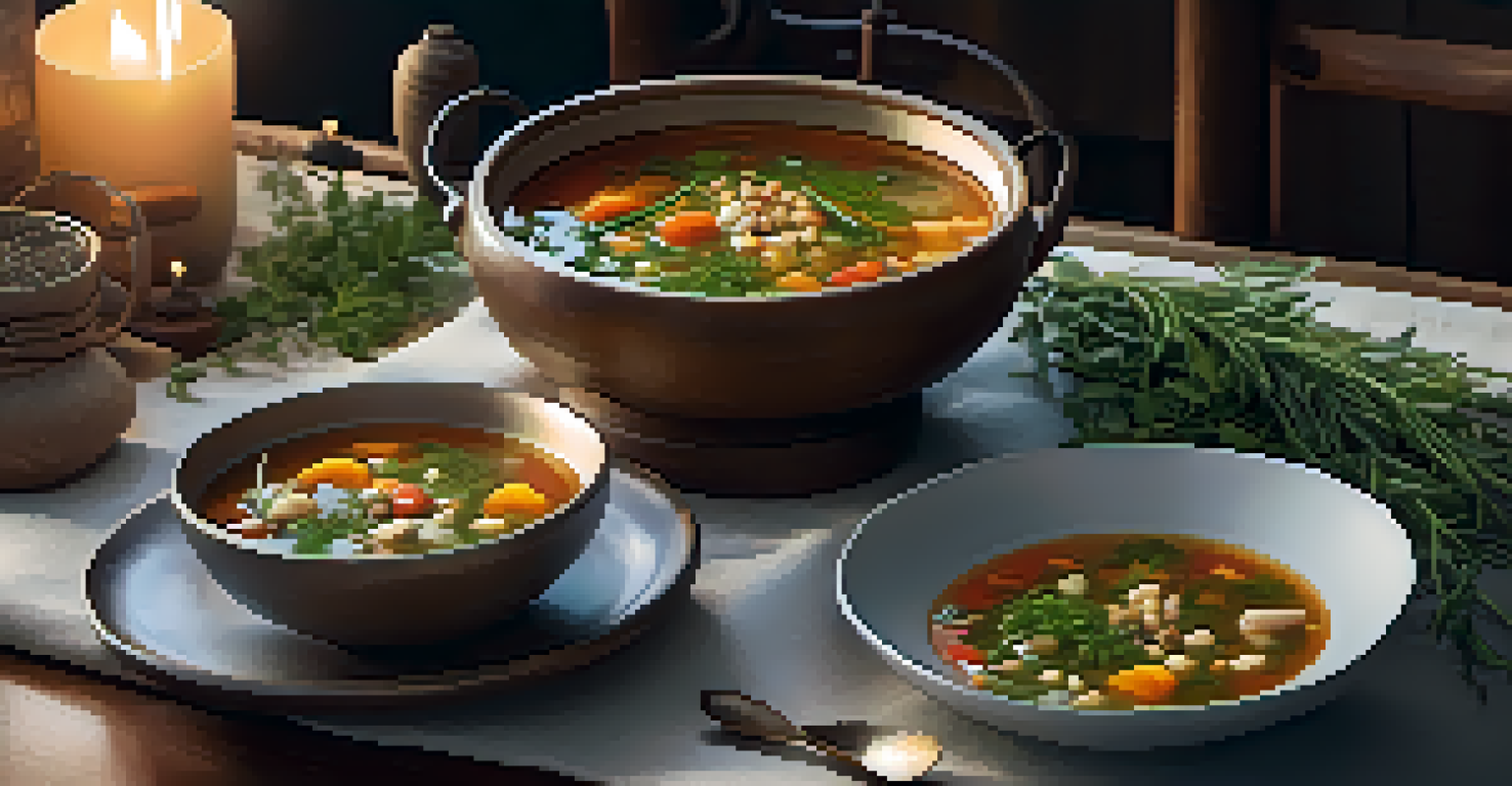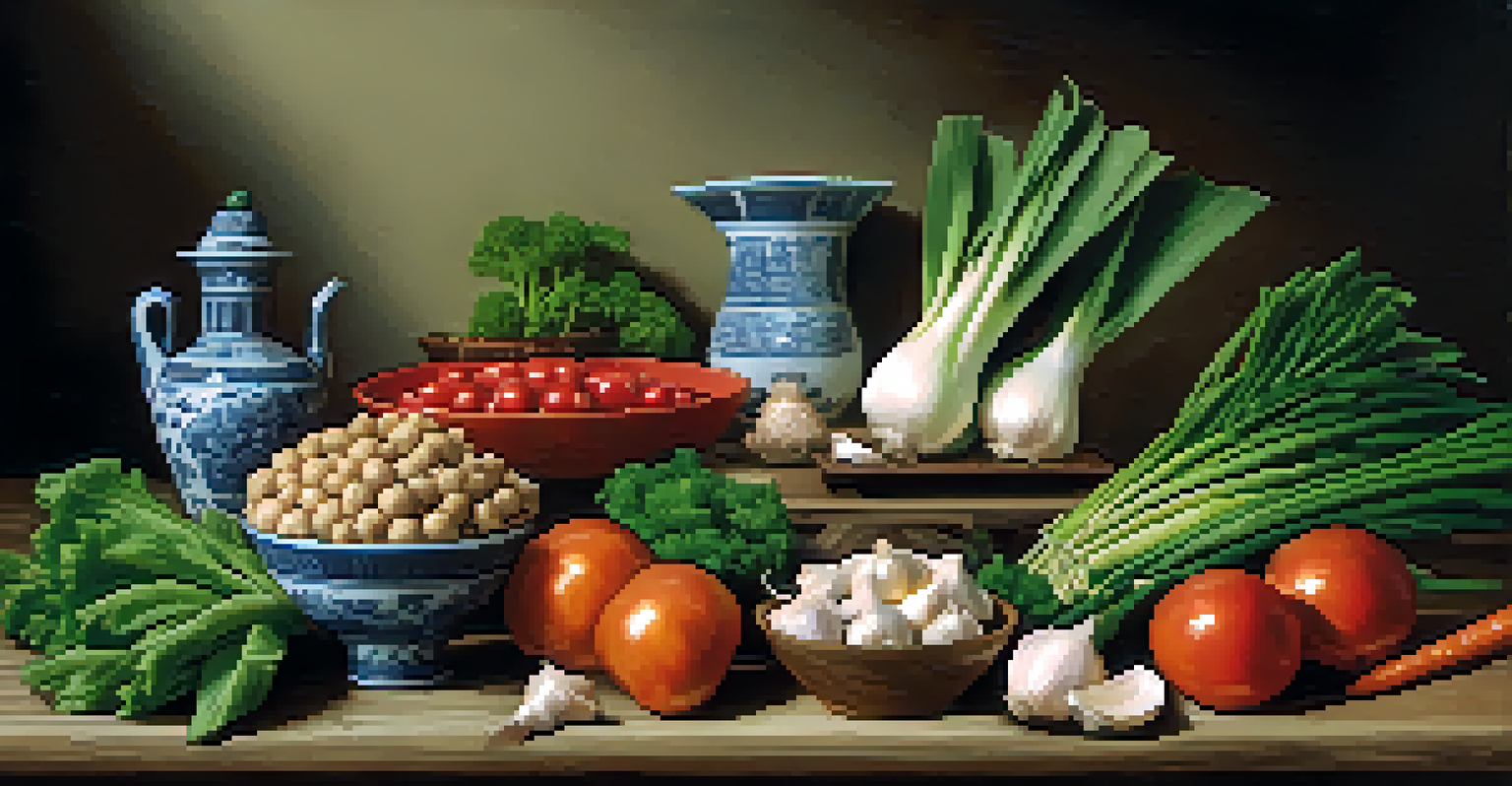Nutritional Therapies: Naturopathy and Traditional Chinese Views

Understanding Naturopathy: A Holistic Approach to Nutrition
Naturopathy is a holistic approach that focuses on treating the whole person rather than just symptoms. It combines modern scientific knowledge with traditional healing methods, emphasizing the body's inherent ability to heal itself. Nutritional therapy is a cornerstone of naturopathy, where food is seen as medicine that supports health and well-being.
The doctor of the future will no longer treat the human frame with drugs, but rather will cure and prevent disease with nutrition.
Practitioners often recommend whole foods, herbs, and dietary adjustments tailored to individual needs. This personalized approach can help address various health issues, from digestive problems to chronic fatigue. In essence, naturopathy encourages individuals to make lifestyle choices that promote optimal health.
By integrating nutrition into treatment plans, naturopathy aims to prevent illness and enhance vitality. This proactive stance can empower individuals to take control of their health and make informed dietary decisions.
Traditional Chinese Medicine: A Different Perspective on Nutrition
Traditional Chinese Medicine (TCM) offers a unique view on nutrition, rooted in thousands of years of practice. It emphasizes the balance of Yin and Yang, and how foods can affect this balance in the body. Rather than focusing solely on macronutrients, TCM considers the energetic properties of foods and their effects on health.

In TCM, foods are categorized into warming and cooling, with dietary recommendations based on an individual's constitution and current health condition. For instance, someone with a cold constitution might benefit from warming foods like ginger, while a person with excess heat may thrive on cooling foods like cucumber. This thoughtful approach highlights the importance of seasonal eating and food preparation methods.
Naturopathy's Holistic Nutrition
Naturopathy focuses on treating the whole person through personalized nutritional therapy, emphasizing food as medicine.
Moreover, TCM integrates the concept of Qi, or life force, which is influenced by what we consume. By nourishing Qi through appropriate food choices, individuals can improve their overall health and well-being, demonstrating the deep connection between diet and lifestyle in this ancient practice.
Comparing Naturopathy and TCM: Similarities and Differences
While both naturopathy and Traditional Chinese Medicine focus on holistic health, their methodologies and philosophies differ. Naturopathy often emphasizes natural remedies, including vitamins and supplements, while TCM relies heavily on herbal medicine and acupuncture to restore balance. Both systems, however, recognize the vital role of nutrition in achieving optimal health.
Let food be thy medicine and medicine be thy food.
In terms of treatment, naturopathy may provide specific dietary guidelines based on scientific research, whereas TCM draws upon centuries of traditional knowledge to determine dietary practices. This contrast shows how each system values its unique cultural heritage while aiming for the same goal: health and wellness.
Despite their differences, both approaches encourage individuals to listen to their bodies and make informed choices. This shared philosophy can lead to a more personalized and effective nutritional therapy experience.
The Role of Food as Medicine in Naturopathy
In naturopathy, the idea that 'food is medicine' underscores the importance of diet in disease prevention and management. Nutritional therapists assess an individual's dietary habits and make tailored recommendations to support healing and health maintenance. This perspective empowers clients to view food not just as sustenance but as a vital component of their health journey.
For example, someone with high cholesterol might be advised to incorporate more fiber-rich foods, such as whole grains and legumes, into their diet. This proactive approach can lead to significant improvements in health markers and overall well-being. Additionally, naturopathy supports the use of organic and locally sourced foods to enhance nutrient intake.
TCM's Energetic Food Approach
Traditional Chinese Medicine categorizes foods based on their energetic properties, promoting balance through dietary choices.
Ultimately, the emphasis on food as medicine encourages individuals to explore the healing properties of various foods, fostering a deeper connection with what they eat. It promotes the idea that making mindful dietary choices can lead to lasting health benefits.
Food Energies and Their Significance in TCM
In Traditional Chinese Medicine, the concept of food energies plays a crucial role in dietary recommendations. Each food is believed to possess specific energetic qualities that can influence the body's balance of Yin and Yang. Understanding these properties allows individuals to make informed food choices that align with their health needs.
For instance, warming foods like garlic and cinnamon can stimulate digestion and enhance circulation, making them ideal for colder months or for individuals with sluggish digestion. Conversely, cooling foods such as watermelon and lettuce help to counteract heat and inflammation, suitable for hot weather or fiery temperaments. This nuanced understanding of food energies illustrates TCM's holistic approach.
By incorporating food energies into their dietary practices, individuals can better navigate their health and wellness journey. This flexibility allows for a more personalized approach, emphasizing the importance of listening to one's body and responding accordingly.
Integrating Naturopathy and TCM for Optimal Health
Integrating the principles of naturopathy and Traditional Chinese Medicine can create a comprehensive approach to nutritional therapy. By blending the scientific insights of naturopathy with the ancient wisdom of TCM, individuals can benefit from a well-rounded perspective on their health. This fusion allows for a more personalized treatment plan that considers both the physical and energetic aspects of well-being.
For example, a person may receive dietary advice based on their unique health constitution from TCM, while also incorporating specific nutrients recommended by naturopaths. This collaborative approach can enhance the effectiveness of dietary interventions and lead to better health outcomes. Additionally, integrating these practices encourages a greater awareness of the interconnectedness of body, mind, and spirit.
Integrating Naturopathy and TCM
Combining the insights of naturopathy with the wisdom of TCM offers a comprehensive approach to enhancing health and wellness.
Ultimately, embracing both naturopathy and TCM principles empowers individuals to take charge of their health. By recognizing the value of diverse nutritional therapies, individuals can cultivate a more balanced and fulfilling approach to wellness.
Practical Steps to Embrace Nutritional Therapies
Embracing nutritional therapies from both naturopathy and Traditional Chinese Medicine can start with small, manageable changes in one's diet. Begin by evaluating your current eating habits and consider incorporating more whole foods, such as fruits, vegetables, whole grains, and lean proteins. Seasonal eating, a key principle in both practices, encourages individuals to choose foods that are fresh and locally available.
Experimenting with new ingredients, like herbs and spices, can also enhance your meals while providing health benefits. For example, adding turmeric for its anti-inflammatory properties or enjoying a cup of ginger tea can be beneficial. Additionally, seeking guidance from qualified practitioners can help tailor your approach and ensure that it aligns with your unique health needs.

By taking these practical steps, you can gradually integrate the philosophies of naturopathy and TCM into your daily life. This journey not only promotes better health but also fosters a deeper connection with the food you consume, transforming your relationship with nutrition.